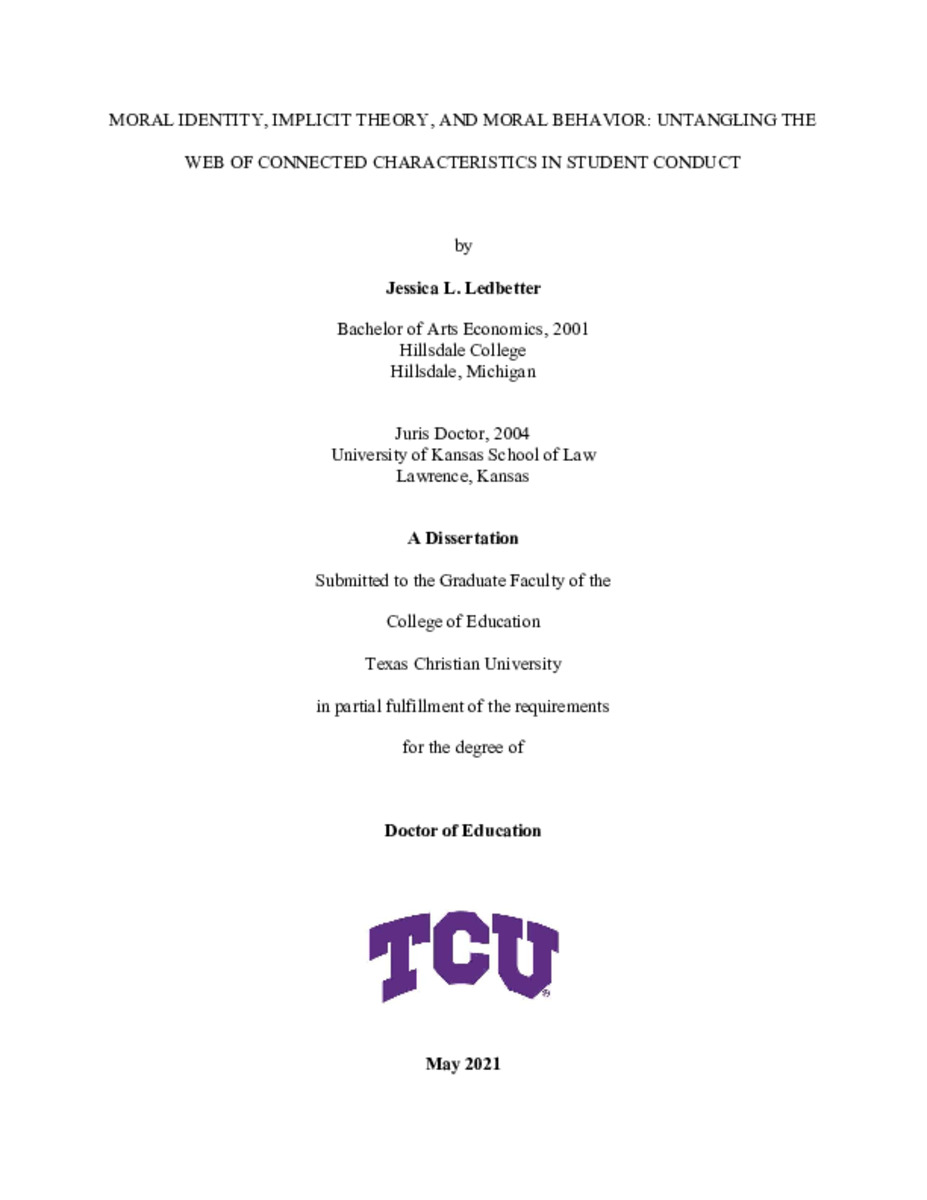Moral Identity, Implicit Theory, and Moral Behavior: Untangling the Web of Connected Characteristics in Student ConductShow full item record
| Title | Moral Identity, Implicit Theory, and Moral Behavior: Untangling the Web of Connected Characteristics in Student Conduct |
|---|---|
| Author | Ledbetter, Jessica L. |
| Date | 2021-05 |
| Genre | Dissertation |
| Degree | Doctor of Education |
| Abstract | Student misconduct continues to trouble institutions, negatively affecting institutional mission fulfillment. Although student codes of conduct and related processes exist to establish standards and address behavioral concerns, little research has proactively explored what characteristics impact student moral behavior intentions and understanding, and how these characteristics influence student perceptions of these code practices. This dissertation investigates the extent to which student moral mindset, moral identity internalization and symbolization, and the interaction of internalization and symbolization predict (a) moral behavior intentions toward common areas of student misconduct, (b) communal consciousness in making moral behavior decisions, and (c) student code of conduct perspectives. Through a conditional process model analysis (Hayes, 2013), the findings of this study indicate that moral identity internalization is a key mediator between student moral mindset and both moral behavior intentionality and communal consciousness outcomes. In some cases, moral identity symbolization moderated the impact of internalization on the moral behavior outcomes investigated. Patterns for intended substance use outcomes differed substantially from those found for the other behavioral intent variables explored. Similarly, moral identity internalization mediated the relationship between student moral mindset and student consideration of code of conduct policies in behavior decisions, yet no such association emerged for how students evaluate the code of conduct. These findings provide a foundation for further research and theory in this area. Practically, higher education administrators can use these results to engage creative solutions and programming across the curriculum, both inside and outside the classroom, to help prevent student misconduct before it begins. |
| Link | https://repository.tcu.edu/handle/116099117/47447 |
| Department | Education |
| Advisor | Quinn, Brandy |
Files in this item
This item appears in the following Collection(s)
- Doctoral Dissertations [1526]
Related items
Showing a few items related by title, author, creator and subject.
-
A Blacklands morality play: Central Texas farmers during the agricultural revolution of 1880-1930
Arnold, Watson Caufield (2006)This paper traces in detail the lives, investments, expenses, and debts of two related Texas families between 1880 and 1930. During this period, as the rural population moved into the cities, agriculture and land ownership ... -
The morals and taste of a nation: rhetoric, criticism, and the rise of the English novel
Downs, Jack Matthew (2011)The task of developing a history of the English novel requires the inclusion of a vast range of cultural, economic, religious, social, and aesthetic influences. But the role of eighteenth-century English rhetorical theory ... -
The spirit and social and moral identity in Paul's letter to the Galatians
Berry, Wade Jason (2011)This study explains Paul's assertions about the Spirit in his letter to the Galatians by exploring the role the Spirit plays in his identity construction strategy. The study's argument moves in four stages. First, it argues ...
© TCU Library 2015 | Contact Special Collections |
HTML Sitemap





